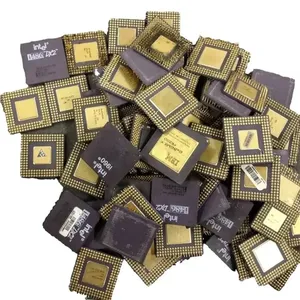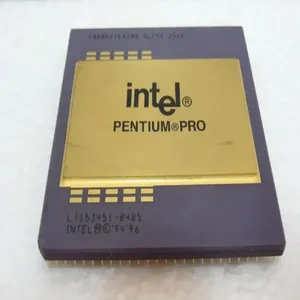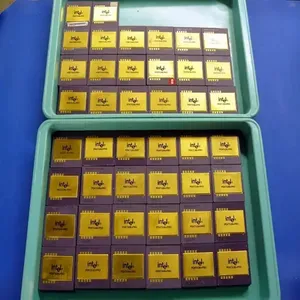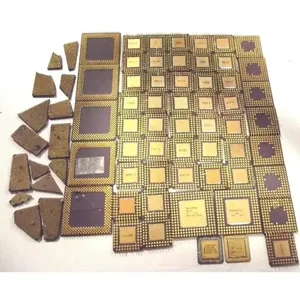
All categories
Featured selections
Trade Assurance
Buyer Central
Help Center
Get the app
Become a supplier

(3362 products available)







































Computer scrap refers to old or discarded computers and their vital parts that cannot be used for their original purpose. These are generally out of service and are considered waste or scrap. Computer scrap is an essential source of materials for recycling and can be a good computer scrap sale. Transforming computer scrap into recovered materials helps conserve resources and minimize the impact on the environment. Computer scrap can be divided into various categories depending on the type of material and the part of the computer.
Adaptable Components and Upcycling:
Computer scrap encompasses a variety of components, including hard drives, motherboards, and memory chips. By repurposing these parts, businesses can create unique and customized electronic products that are both innovative and environmentally friendly. Upcycling using computer scrap promotes sustainability within the tech industry while adding value through creativity and resourcefulness.
Sourcing Value:
Computer scrap presents a valuable opportunity for businesses looking to source low-cost raw materials. Buying computer scrap for sale enables companies to obtain materials that can be processed and turned into finished products at a fraction of the cost. This can significantly reduce production expenses and enhance competitiveness in the market. Moreover, sourcing from different suppliers ensures a constant supply of computer scrap, which is essential for consistent operations. Another benefit of sourcing computer scrap is the diverse range of components found within discarded electronics. This variety allows businesses to selectively extract parts that are most useful for their production needs, further minimizing waste and optimizing resource utilization.
Environmental Impact and Compliance:
Handling computer scrap responsibly helps businesses comply with local regulations regarding electronic waste disposal, recycling, and data security. It also promotes environmental conservation by reducing landfill waste, conserving natural resources, and decreasing harmful emissions from incineration. Moreover, recycling computer scrap can prevent soil and water pollution caused by toxic substances found in electronic components, such as lead, mercury, and cadmium. Safeguarding human health and ecosystems through responsible scrap management contributes towards a cleaner and safer environment for all.
Valuable Materials Recycling:
Computer scrap recycling recovers precious metals like gold, silver, copper, and aluminum. These metals can be refined and reused in new electronic devices, reducing the need for mining and conserving natural resources. Additionally, circuit boards, wires, and connectors often contain copper, which is highly sought after for electrical components and construction materials. Plastic parts from computers also contain valuable polymers that can be reprocessed into plastic products or used as filler materials in construction projects. By extracting and recycling these materials from computer scrap, businesses can promote resource conservation and contribute to a circular economy where resources are kept in use for as long as possible.
Computer scrap can be used in many industries, from art to energy production. Below are some applications of computer scrap:
Repurposing and Upcycling
Copper scraps, such as wires, can be transformed into beautiful pieces of jewelry or artwork. Scrappy artists and designers use wire to create wall decor, photo frames, and sculptures. Computer scrap can also be used to make planters, garden tools, and furniture pieces. Upcycling helps reduce waste and adds value to scrap materials.
Construction and Renovation
Construction workers can use metal scrap to build temporary structures at construction sites. Wires and cables can be used for basic Electrical work during renovation. Chain links can be turned into fencing materials for properties. Also, some furniture made with metal and wood scraps can be used to furnish offices and homes. Using computer scrap for construction helps reduce the demand for new raw materials.
Manufacturing and Production
Metal scraps from computers, such as aluminum and steel, can be melted down and refined. The renewed metal can be used to make tools, machinery parts, and new electronic devices. Plastic scraps can also be melted and molded into plastic items like containers, pallets, and components. Scrap recycling allows manufacturers to create products with less energy.
Electronics Recovery and Resource Extraction
Recycling old computers provides precious metals like gold, silver, and platinum. These metals can be extracted from circuit boards and connectors. Some electronic components also contain lithium, copper, and rare earth elements. These materials can be used for battery production and other electronic devices. Mining these resources from old computers is more sustainable than traditional mining.
Power Generation
Used computers and electronic waste can be utilized to generate energy. Scrap metal from old machines can also be used to produce biofuel. Burning metal helps reduce landfill waste. However, emissions produced by burning metals need to be treated with care. Converting scrap materials into energy creates a new energy source that can replace fossil fuels.
DIY Projects and Hobbies
Computer scrap can be used for various DIY projects to relax the mind and body. Wood scraps can be used to build birdhouses, and knobs from old computers can be turned into coat hangers. Wires, motherboards, and cables can be used to teach kids science concepts like electricity and machines. Playing with computer scraps helps promote creative thinking and introduces children to basic technology. Neighborhoods and communities can benefit from using computer scraps to reduce waste and promote their use in local stores. Business buyers can purchase computer scrap in bulk to inspire new ideas and innovations in their industry.
When purchasing computer scraps for sale, it is important to examine the supplier's variety and level of quality. Different types of scrap computers serve distinct uses. Choose suppliers who offer a wide variety of sorts so you may select the ones that best meet your business needs. Make sure the sources consistently provide high-quality commodities. Examine reviews and ask for recommendations to find reputable suppliers. The scrap's quality affects how well it works in different uses. Choose computer scrap with the required grades and specifications for your applications. If refining precious metals is part of the business plan, look for computer scrap with significant concentrations of those materials. The proportions of gold, silver, platinum, and palladium are important. Make sure the supplier complies with local environmental laws. Proper handling and disposal of hazardous materials in scrap computers are required for responsible environmental management.
Consider the cleanliness of the computer scrap and whether it has been properly processed before purchasing. The source of the scrap computers significantly influences their quality and state. To maintain the cleanliness and quality of the goods, choose providers who obtain scrap from trustworthy sources. Inquire about the computer scrap prices and the weights the suppliers use to charge. Ensure the calculations are accurate and that the pricing is reasonable. Choose suppliers who offer competitive pricing without sacrificing quality. Make sure the supplier can deliver the computer scrap on time consistently. Delays in the supply of scrap materials can disrupt the production processes. To foster a strong working partnership, communicate clearly and professionally with the chosen supplier.
Q1: What is the benefit of buying computer scrap in bulk?
A1: Buying computer scrap in bulk can yield savings and reduce the cost of reprocessing a single unit. Bulk purchases may come with discounts, and working with a single supplier can create a long-term partnership, which may also come with better pricing.
Q2: How is computer scrap recycled?
A2: Recycling computer scrap involves collection and processing, during which different materials are separated. The scrap is then shredded, and the recycling unit will stamp out metals. Electronics recycling also includes data wiping.
Q3: Are there regulations for recycling computer scrap?
A3: Computer waste recycling is regulated and has guidelines to protect the environment and human health. Recyclers should be aware of local and international laws and regulations regarding e-waste disposal and recycling.
Q4: What are the risks of handling computer scrap?
A4: Computer scrap has sharp objects that can cause cuts and bruises. Also, old computers may contain toxic materials like lead, mercury, and cadmium, and improper handling can expose the skin to these harmful chemicals.